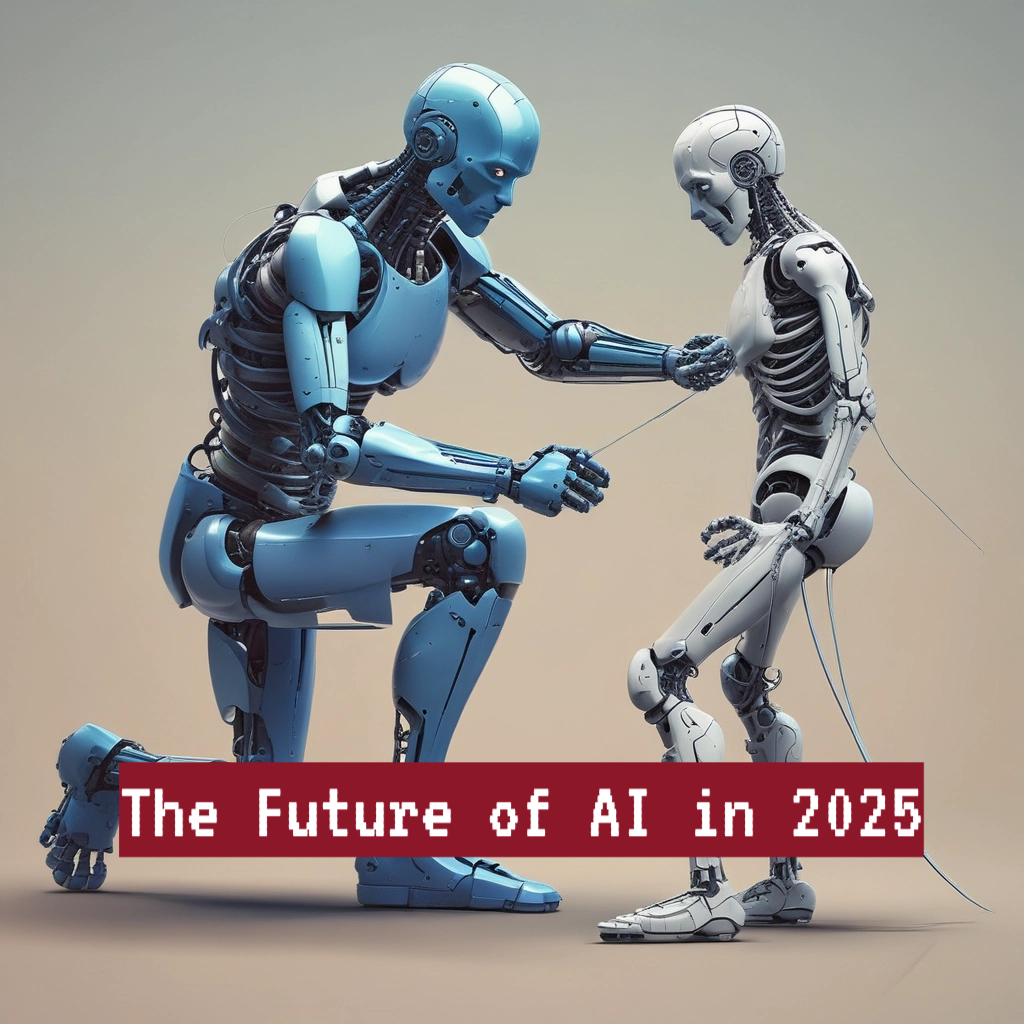Synthetic Cognition: Designing AI Systems That Think Like Scientists
Can machines ever generate hypotheses, conduct experiments, and revise theories like human scientists? With AI evolving rapidly, we may be closer than we think.

The year 2025 is just around the corner, and AI is expected to make even more significant strides, transforming industries, daily life, and global economies.
Table of contents [Show]
Key Developments:
Self-Learning AI (AGI Steps Closer)
AI models will require less human intervention, improving themselves through reinforcement learning and meta-learning.
Systems like DeepMind’s AlphaFold (for protein folding) will evolve to solve even more complex scientific problems autonomously.
AI-Driven AI Development (AI Building AI)
Companies like OpenAI, Google DeepMind, and Anthropic will use AI to design better neural architectures, reducing human effort in AI research.
Tools like AutoML will become mainstream, allowing businesses to create custom AI models without coding.
Autonomous Agents for Work & Daily Life
AI agents (e.g., DevOps bots, AI lawyers, financial advisors) will handle complex tasks with minimal oversight.
Personal AI assistants (like ChatGPT++) will manage emails, negotiations, and even make purchases autonomously.
Impact:
✔ Faster innovation in AI
✔ Reduced need for human AI engineers
❌ Risks of uncontrollable AI if not properly regulated
Key Developments:
Hyper-Realistic Media (Deepfakes 2.0)
AI-generated videos, images, and voices will be indistinguishable from reality, raising concerns about misinformation.
Tools like OpenAI’s Sora (video generation), MidJourney v6, and DALL·E 4 will produce Hollywood-grade content.
Personalized Content Creation
AI will generate custom movies, music, and books tailored to individual tastes (e.g., "Netflix but AI-generated").
Platforms like Spotify & YouTube will auto-generate songs and videos based on user preferences.
3D & Immersive AI
AI will create virtual worlds for gaming (e.g., Unreal Engine + AI) and metaverse applications.
NVIDIA’s AI-generated 3D models will speed up game and film production.
Impact:
✔ Democratization of content creation
❌ Increased deepfake fraud & identity theft
Key Developments:
AI Doctors & Diagnostics
AI will outperform humans in radiology, pathology, and early disease detection (e.g., Google’s Med-PaLM 3).
Wearables (like Apple Watch + AI) will predict heart attacks and strokes in real time.
Personalized Medicine
AI will analyze genomic data to recommend tailored treatments for cancer, diabetes, and rare diseases.
Startups like Tempus & Deep Genomics will lead this space.
Faster Drug Discovery
AI models (e.g., AlphaFold 3, Insilico Medicine) will cut drug development time from 10 years to 1-2 years.
AI-designed molecules will target previously "undruggable" diseases.
Impact:
✔ Earlier disease detection & personalized care
❌ Ethical concerns over AI misdiagnosis & liability
Key Developments:
Humanoid Robots Enter Workforce
Tesla Optimus, Boston Dynamics Atlas, and Figure 01 will perform warehouse labor, elder care, and retail jobs.
Amazon’s Digit robots will automate last-mile deliveries.
Autonomous Vehicles & Drones
Waymo, Tesla FSD, and Cruise will expand robotaxi services globally.
AI drones (Zipline, Amazon Prime Air) will deliver packages in cities.
Smart Factories & Warehouses
Fully automated "dark factories" (no human workers) will emerge.
NVIDIA’s Isaac Robotics Platform will power AI-driven industrial robots.
Impact:
✔ Increased productivity & cost savings
❌ Massive job displacement in manufacturing & logistics
Key Developments:
Stricter AI Laws (EU AI Act, US AI Executive Orders)
Governments will enforce transparency, bias audits, and accountability for AI systems.
AI watermarking will be mandatory for generated content.
Deepfake & Misinformation Crackdowns
Laws will require AI-generated content disclosure (e.g., "This video was made by AI").
Social media platforms will deploy AI deepfake detectors.
Job Displacement & UBI Debates
Governments may test universal basic income (UBI) to offset AI-driven unemployment.
Reskilling programs will emerge for displaced workers.
Impact:
✔ More responsible AI development
❌ Slower AI adoption due to compliance hurdles
Key Developments:
AI CEOs & Executives
Some startups will experiment with AI board members for data-driven decisions.
Tools like ChatGPT Enterprise will draft business strategies.
Real-Time Consumer Insights
AI will predict market trends & customer behavior with 95%+ accuracy.
Dynamic pricing AI (like Uber’s surge pricing) will dominate e-commerce.
AI-Powered Startups
No-code AI tools (Runway, Bubble AI) will let non-technical founders build AI companies.
Impact:
✔ Smarter, faster business decisions
❌ Small businesses may struggle to compete with AI-driven giants
Key Developments:
AI-Generated Virtual Worlds
Games like Fortnite & Roblox will use AI to create infinite, dynamic worlds.
NVIDIA’s Omniverse will power AI-driven simulations.
AI Companions & NPCs
Lifelike AI characters (e.g., Inworld AI) will act as friends, tutors, or therapists in VR.
Brain-Computer Interfaces (BCIs)
Early Neuralink & Synchron trials will allow AI-assisted thought-to-text communication.
Impact:
✔ More immersive digital experiences
❌ Privacy risks from AI monitoring brain data
Key Developments:
Autonomous Weapons (Drones, Swarm Tech)
Military drones will use AI for target identification (raising ethical concerns).
AI-powered cyber warfare will escalate between nations.
AI vs. AI Cybersecurity Battles
Hackers will use AI-generated malware, while defenders deploy AI threat detection.
Zero-trust AI security will become standard.
Impact:
✔ Faster threat detection
❌ Risk of AI-driven cyber conflicts & autonomous warfare
Final Thoughts
2025 will be a pivotal year for AI, bringing both groundbreaking advancements and serious ethical challenges. The key will be balancing innovation with regulation to ensure AI benefits humanity.
Can machines ever generate hypotheses, conduct experiments, and revise theories like human scientists? With AI evolving rapidly, we may be closer than we think.
Master advanced text generation with the OpenAI API. Learn expert prompt engineering, temperature control, function calling, and real-world GPT-4 use cases to build smarter AI applications.
Discover how chatbots work behind the scenes with large language models, transformers, and AI training. A deep dive into the tech powering modern AI.

